Analysis of Ethical and Legal Issues in Nursing Professional Standards
VerifiedAdded on 2023/04/03
|8
|2138
|106
Essay
AI Summary
This essay delves into the ethical considerations within nursing, emphasizing the importance of professional standards and conduct. It begins by defining ethics and its relevance to nursing practice, highlighting key principles such as beneficence, non-maleficence, and autonomy. The essay discusses the role of professional standards in ensuring competence and safety in nursing, referencing the American Nursing Association's code of ethics and Florence Nightingale's contributions. It identifies common ethical issues faced by nurses globally, including informed consent, professional boundaries, data privacy, and end-of-life decisions. Strategies for resolving legal and professional issues in clinical practice are explored, such as the formation of ethics committees, enhanced education, and improved communication. The essay concludes by advocating for national and international strategies to support ethical healthcare practices and maintain a competent nursing workforce, emphasizing the need for nurses to uphold the highest ethical principles in their profession.
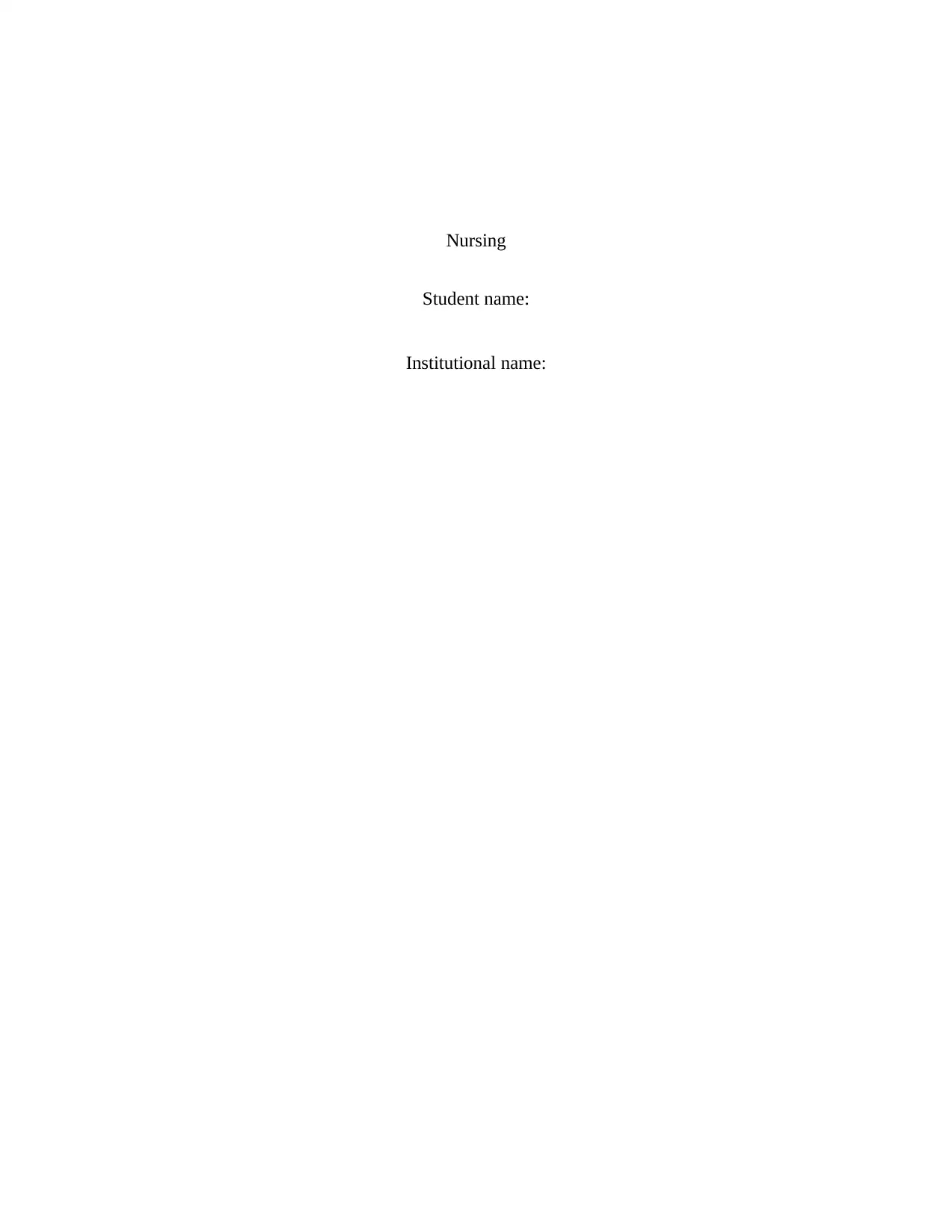
Nursing
Student name:
Institutional name:
Student name:
Institutional name:
Paraphrase This Document
Need a fresh take? Get an instant paraphrase of this document with our AI Paraphraser
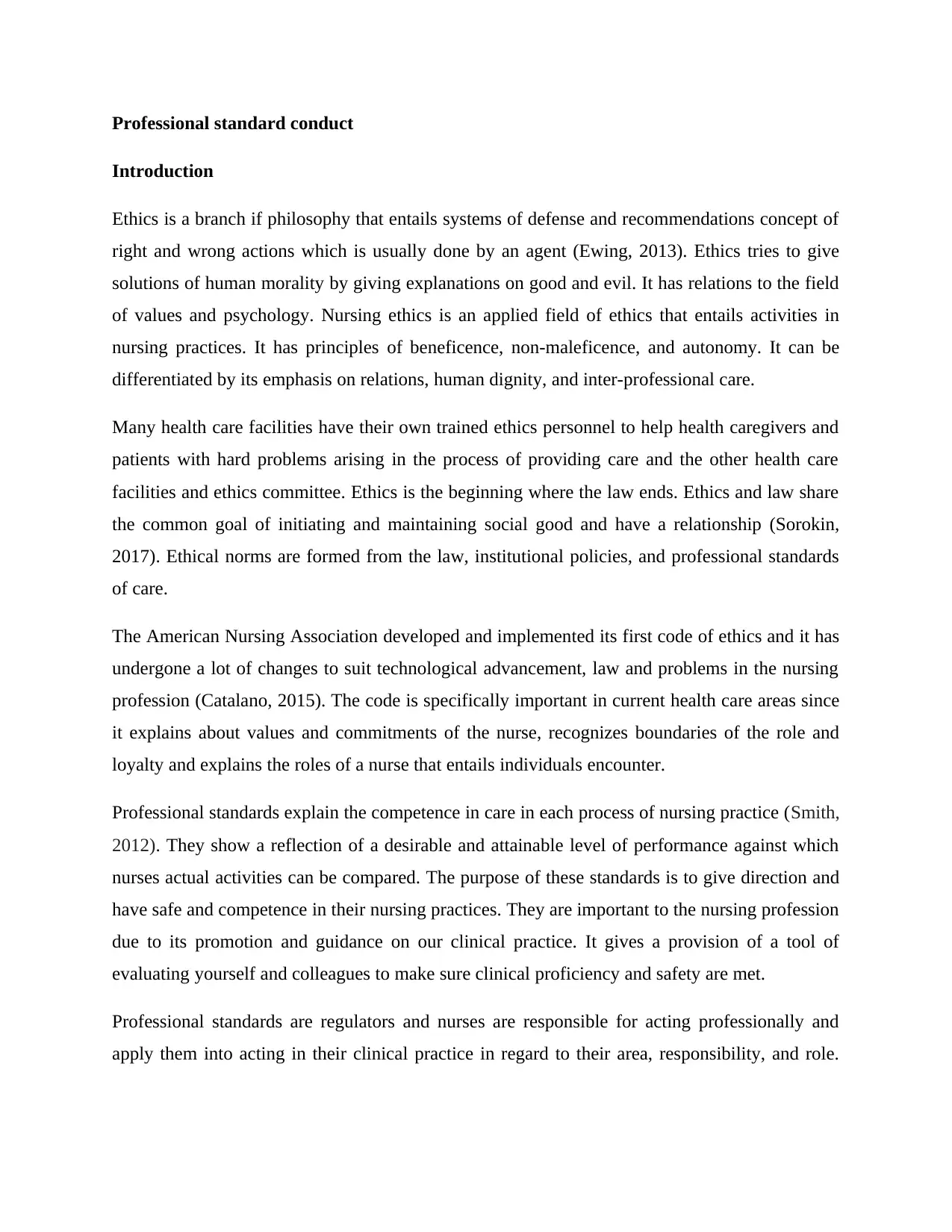
Professional standard conduct
Introduction
Ethics is a branch if philosophy that entails systems of defense and recommendations concept of
right and wrong actions which is usually done by an agent (Ewing, 2013). Ethics tries to give
solutions of human morality by giving explanations on good and evil. It has relations to the field
of values and psychology. Nursing ethics is an applied field of ethics that entails activities in
nursing practices. It has principles of beneficence, non-maleficence, and autonomy. It can be
differentiated by its emphasis on relations, human dignity, and inter-professional care.
Many health care facilities have their own trained ethics personnel to help health caregivers and
patients with hard problems arising in the process of providing care and the other health care
facilities and ethics committee. Ethics is the beginning where the law ends. Ethics and law share
the common goal of initiating and maintaining social good and have a relationship (Sorokin,
2017). Ethical norms are formed from the law, institutional policies, and professional standards
of care.
The American Nursing Association developed and implemented its first code of ethics and it has
undergone a lot of changes to suit technological advancement, law and problems in the nursing
profession (Catalano, 2015). The code is specifically important in current health care areas since
it explains about values and commitments of the nurse, recognizes boundaries of the role and
loyalty and explains the roles of a nurse that entails individuals encounter.
Professional standards explain the competence in care in each process of nursing practice (Smith,
2012). They show a reflection of a desirable and attainable level of performance against which
nurses actual activities can be compared. The purpose of these standards is to give direction and
have safe and competence in their nursing practices. They are important to the nursing profession
due to its promotion and guidance on our clinical practice. It gives a provision of a tool of
evaluating yourself and colleagues to make sure clinical proficiency and safety are met.
Professional standards are regulators and nurses are responsible for acting professionally and
apply them into acting in their clinical practice in regard to their area, responsibility, and role.
Introduction
Ethics is a branch if philosophy that entails systems of defense and recommendations concept of
right and wrong actions which is usually done by an agent (Ewing, 2013). Ethics tries to give
solutions of human morality by giving explanations on good and evil. It has relations to the field
of values and psychology. Nursing ethics is an applied field of ethics that entails activities in
nursing practices. It has principles of beneficence, non-maleficence, and autonomy. It can be
differentiated by its emphasis on relations, human dignity, and inter-professional care.
Many health care facilities have their own trained ethics personnel to help health caregivers and
patients with hard problems arising in the process of providing care and the other health care
facilities and ethics committee. Ethics is the beginning where the law ends. Ethics and law share
the common goal of initiating and maintaining social good and have a relationship (Sorokin,
2017). Ethical norms are formed from the law, institutional policies, and professional standards
of care.
The American Nursing Association developed and implemented its first code of ethics and it has
undergone a lot of changes to suit technological advancement, law and problems in the nursing
profession (Catalano, 2015). The code is specifically important in current health care areas since
it explains about values and commitments of the nurse, recognizes boundaries of the role and
loyalty and explains the roles of a nurse that entails individuals encounter.
Professional standards explain the competence in care in each process of nursing practice (Smith,
2012). They show a reflection of a desirable and attainable level of performance against which
nurses actual activities can be compared. The purpose of these standards is to give direction and
have safe and competence in their nursing practices. They are important to the nursing profession
due to its promotion and guidance on our clinical practice. It gives a provision of a tool of
evaluating yourself and colleagues to make sure clinical proficiency and safety are met.
Professional standards are regulators and nurses are responsible for acting professionally and
apply them into acting in their clinical practice in regard to their area, responsibility, and role.
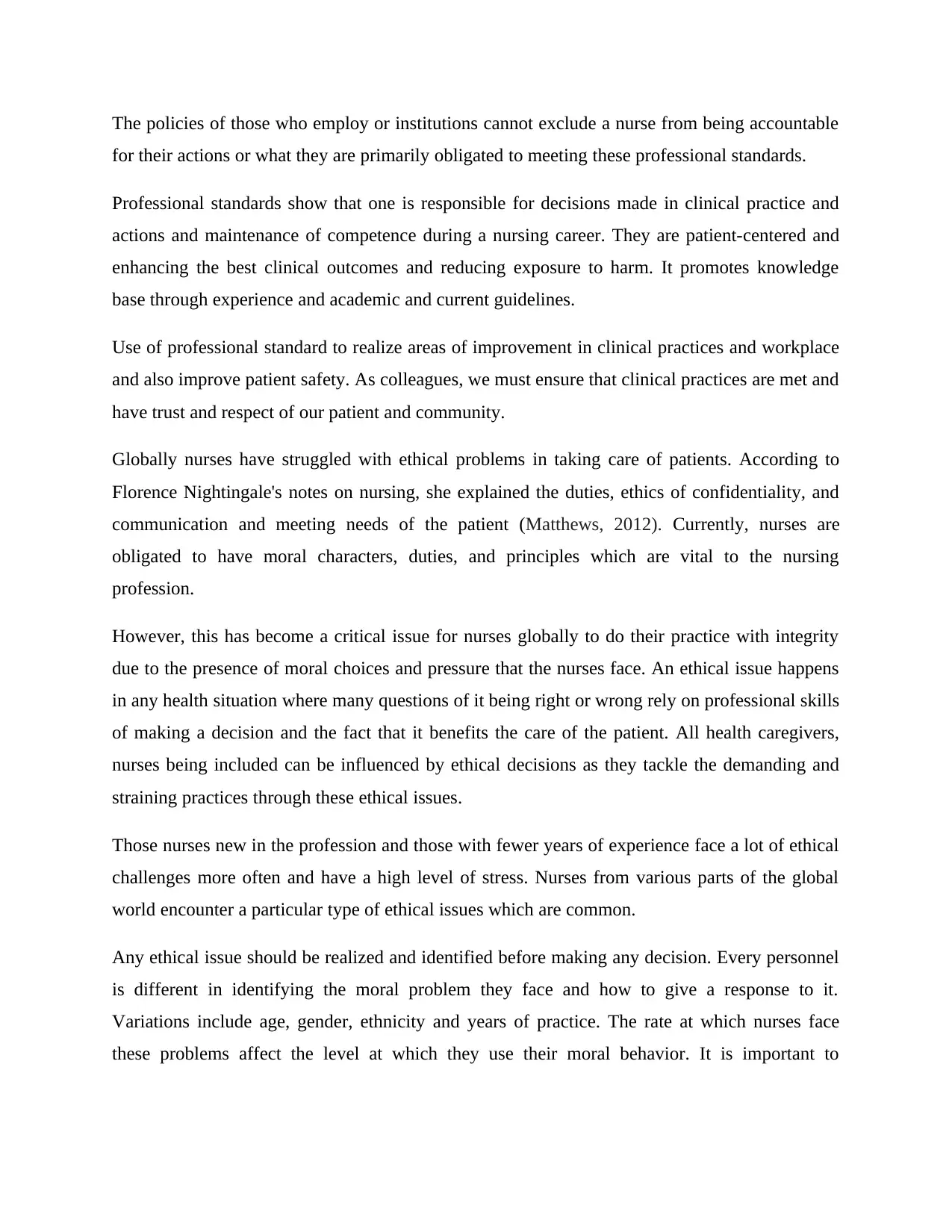
The policies of those who employ or institutions cannot exclude a nurse from being accountable
for their actions or what they are primarily obligated to meeting these professional standards.
Professional standards show that one is responsible for decisions made in clinical practice and
actions and maintenance of competence during a nursing career. They are patient-centered and
enhancing the best clinical outcomes and reducing exposure to harm. It promotes knowledge
base through experience and academic and current guidelines.
Use of professional standard to realize areas of improvement in clinical practices and workplace
and also improve patient safety. As colleagues, we must ensure that clinical practices are met and
have trust and respect of our patient and community.
Globally nurses have struggled with ethical problems in taking care of patients. According to
Florence Nightingale's notes on nursing, she explained the duties, ethics of confidentiality, and
communication and meeting needs of the patient (Matthews, 2012). Currently, nurses are
obligated to have moral characters, duties, and principles which are vital to the nursing
profession.
However, this has become a critical issue for nurses globally to do their practice with integrity
due to the presence of moral choices and pressure that the nurses face. An ethical issue happens
in any health situation where many questions of it being right or wrong rely on professional skills
of making a decision and the fact that it benefits the care of the patient. All health caregivers,
nurses being included can be influenced by ethical decisions as they tackle the demanding and
straining practices through these ethical issues.
Those nurses new in the profession and those with fewer years of experience face a lot of ethical
challenges more often and have a high level of stress. Nurses from various parts of the global
world encounter a particular type of ethical issues which are common.
Any ethical issue should be realized and identified before making any decision. Every personnel
is different in identifying the moral problem they face and how to give a response to it.
Variations include age, gender, ethnicity and years of practice. The rate at which nurses face
these problems affect the level at which they use their moral behavior. It is important to
for their actions or what they are primarily obligated to meeting these professional standards.
Professional standards show that one is responsible for decisions made in clinical practice and
actions and maintenance of competence during a nursing career. They are patient-centered and
enhancing the best clinical outcomes and reducing exposure to harm. It promotes knowledge
base through experience and academic and current guidelines.
Use of professional standard to realize areas of improvement in clinical practices and workplace
and also improve patient safety. As colleagues, we must ensure that clinical practices are met and
have trust and respect of our patient and community.
Globally nurses have struggled with ethical problems in taking care of patients. According to
Florence Nightingale's notes on nursing, she explained the duties, ethics of confidentiality, and
communication and meeting needs of the patient (Matthews, 2012). Currently, nurses are
obligated to have moral characters, duties, and principles which are vital to the nursing
profession.
However, this has become a critical issue for nurses globally to do their practice with integrity
due to the presence of moral choices and pressure that the nurses face. An ethical issue happens
in any health situation where many questions of it being right or wrong rely on professional skills
of making a decision and the fact that it benefits the care of the patient. All health caregivers,
nurses being included can be influenced by ethical decisions as they tackle the demanding and
straining practices through these ethical issues.
Those nurses new in the profession and those with fewer years of experience face a lot of ethical
challenges more often and have a high level of stress. Nurses from various parts of the global
world encounter a particular type of ethical issues which are common.
Any ethical issue should be realized and identified before making any decision. Every personnel
is different in identifying the moral problem they face and how to give a response to it.
Variations include age, gender, ethnicity and years of practice. The rate at which nurses face
these problems affect the level at which they use their moral behavior. It is important to
⊘ This is a preview!⊘
Do you want full access?
Subscribe today to unlock all pages.

Trusted by 1+ million students worldwide
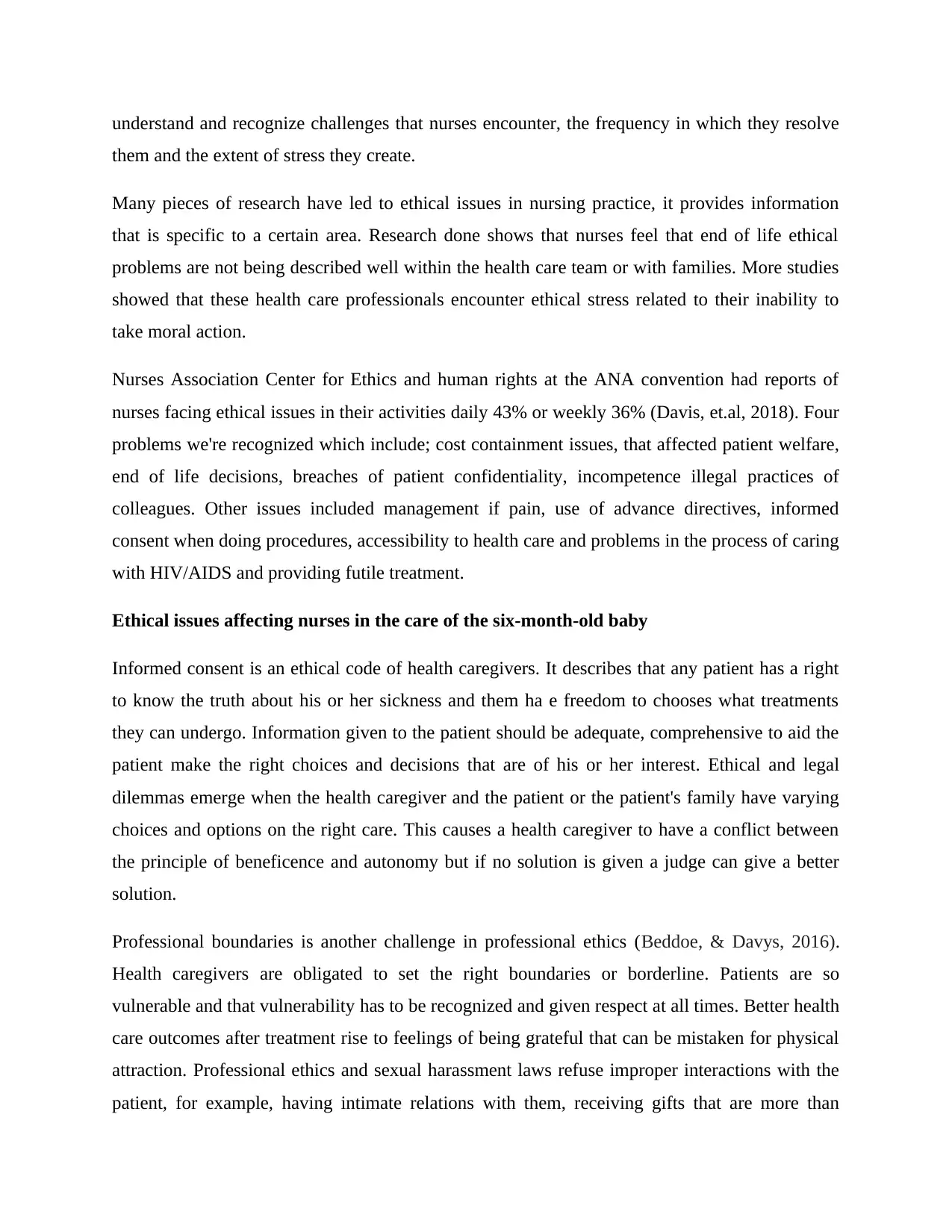
understand and recognize challenges that nurses encounter, the frequency in which they resolve
them and the extent of stress they create.
Many pieces of research have led to ethical issues in nursing practice, it provides information
that is specific to a certain area. Research done shows that nurses feel that end of life ethical
problems are not being described well within the health care team or with families. More studies
showed that these health care professionals encounter ethical stress related to their inability to
take moral action.
Nurses Association Center for Ethics and human rights at the ANA convention had reports of
nurses facing ethical issues in their activities daily 43% or weekly 36% (Davis, et.al, 2018). Four
problems we're recognized which include; cost containment issues, that affected patient welfare,
end of life decisions, breaches of patient confidentiality, incompetence illegal practices of
colleagues. Other issues included management if pain, use of advance directives, informed
consent when doing procedures, accessibility to health care and problems in the process of caring
with HIV/AIDS and providing futile treatment.
Ethical issues affecting nurses in the care of the six-month-old baby
Informed consent is an ethical code of health caregivers. It describes that any patient has a right
to know the truth about his or her sickness and them ha e freedom to chooses what treatments
they can undergo. Information given to the patient should be adequate, comprehensive to aid the
patient make the right choices and decisions that are of his or her interest. Ethical and legal
dilemmas emerge when the health caregiver and the patient or the patient's family have varying
choices and options on the right care. This causes a health caregiver to have a conflict between
the principle of beneficence and autonomy but if no solution is given a judge can give a better
solution.
Professional boundaries is another challenge in professional ethics (Beddoe, & Davys, 2016).
Health caregivers are obligated to set the right boundaries or borderline. Patients are so
vulnerable and that vulnerability has to be recognized and given respect at all times. Better health
care outcomes after treatment rise to feelings of being grateful that can be mistaken for physical
attraction. Professional ethics and sexual harassment laws refuse improper interactions with the
patient, for example, having intimate relations with them, receiving gifts that are more than
them and the extent of stress they create.
Many pieces of research have led to ethical issues in nursing practice, it provides information
that is specific to a certain area. Research done shows that nurses feel that end of life ethical
problems are not being described well within the health care team or with families. More studies
showed that these health care professionals encounter ethical stress related to their inability to
take moral action.
Nurses Association Center for Ethics and human rights at the ANA convention had reports of
nurses facing ethical issues in their activities daily 43% or weekly 36% (Davis, et.al, 2018). Four
problems we're recognized which include; cost containment issues, that affected patient welfare,
end of life decisions, breaches of patient confidentiality, incompetence illegal practices of
colleagues. Other issues included management if pain, use of advance directives, informed
consent when doing procedures, accessibility to health care and problems in the process of caring
with HIV/AIDS and providing futile treatment.
Ethical issues affecting nurses in the care of the six-month-old baby
Informed consent is an ethical code of health caregivers. It describes that any patient has a right
to know the truth about his or her sickness and them ha e freedom to chooses what treatments
they can undergo. Information given to the patient should be adequate, comprehensive to aid the
patient make the right choices and decisions that are of his or her interest. Ethical and legal
dilemmas emerge when the health caregiver and the patient or the patient's family have varying
choices and options on the right care. This causes a health caregiver to have a conflict between
the principle of beneficence and autonomy but if no solution is given a judge can give a better
solution.
Professional boundaries is another challenge in professional ethics (Beddoe, & Davys, 2016).
Health caregivers are obligated to set the right boundaries or borderline. Patients are so
vulnerable and that vulnerability has to be recognized and given respect at all times. Better health
care outcomes after treatment rise to feelings of being grateful that can be mistaken for physical
attraction. Professional ethics and sexual harassment laws refuse improper interactions with the
patient, for example, having intimate relations with them, receiving gifts that are more than
Paraphrase This Document
Need a fresh take? Get an instant paraphrase of this document with our AI Paraphraser
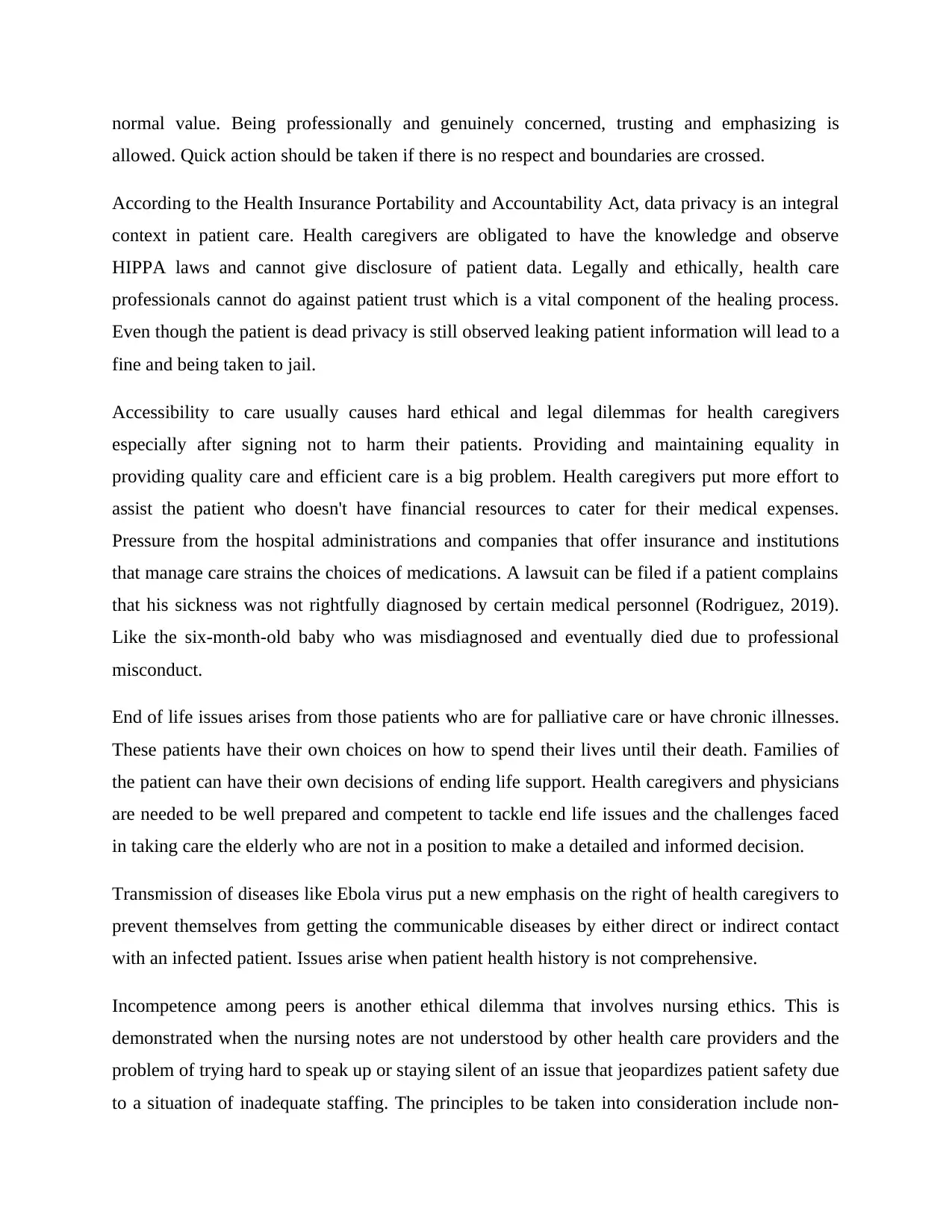
normal value. Being professionally and genuinely concerned, trusting and emphasizing is
allowed. Quick action should be taken if there is no respect and boundaries are crossed.
According to the Health Insurance Portability and Accountability Act, data privacy is an integral
context in patient care. Health caregivers are obligated to have the knowledge and observe
HIPPA laws and cannot give disclosure of patient data. Legally and ethically, health care
professionals cannot do against patient trust which is a vital component of the healing process.
Even though the patient is dead privacy is still observed leaking patient information will lead to a
fine and being taken to jail.
Accessibility to care usually causes hard ethical and legal dilemmas for health caregivers
especially after signing not to harm their patients. Providing and maintaining equality in
providing quality care and efficient care is a big problem. Health caregivers put more effort to
assist the patient who doesn't have financial resources to cater for their medical expenses.
Pressure from the hospital administrations and companies that offer insurance and institutions
that manage care strains the choices of medications. A lawsuit can be filed if a patient complains
that his sickness was not rightfully diagnosed by certain medical personnel (Rodriguez, 2019).
Like the six-month-old baby who was misdiagnosed and eventually died due to professional
misconduct.
End of life issues arises from those patients who are for palliative care or have chronic illnesses.
These patients have their own choices on how to spend their lives until their death. Families of
the patient can have their own decisions of ending life support. Health caregivers and physicians
are needed to be well prepared and competent to tackle end life issues and the challenges faced
in taking care the elderly who are not in a position to make a detailed and informed decision.
Transmission of diseases like Ebola virus put a new emphasis on the right of health caregivers to
prevent themselves from getting the communicable diseases by either direct or indirect contact
with an infected patient. Issues arise when patient health history is not comprehensive.
Incompetence among peers is another ethical dilemma that involves nursing ethics. This is
demonstrated when the nursing notes are not understood by other health care providers and the
problem of trying hard to speak up or staying silent of an issue that jeopardizes patient safety due
to a situation of inadequate staffing. The principles to be taken into consideration include non-
allowed. Quick action should be taken if there is no respect and boundaries are crossed.
According to the Health Insurance Portability and Accountability Act, data privacy is an integral
context in patient care. Health caregivers are obligated to have the knowledge and observe
HIPPA laws and cannot give disclosure of patient data. Legally and ethically, health care
professionals cannot do against patient trust which is a vital component of the healing process.
Even though the patient is dead privacy is still observed leaking patient information will lead to a
fine and being taken to jail.
Accessibility to care usually causes hard ethical and legal dilemmas for health caregivers
especially after signing not to harm their patients. Providing and maintaining equality in
providing quality care and efficient care is a big problem. Health caregivers put more effort to
assist the patient who doesn't have financial resources to cater for their medical expenses.
Pressure from the hospital administrations and companies that offer insurance and institutions
that manage care strains the choices of medications. A lawsuit can be filed if a patient complains
that his sickness was not rightfully diagnosed by certain medical personnel (Rodriguez, 2019).
Like the six-month-old baby who was misdiagnosed and eventually died due to professional
misconduct.
End of life issues arises from those patients who are for palliative care or have chronic illnesses.
These patients have their own choices on how to spend their lives until their death. Families of
the patient can have their own decisions of ending life support. Health caregivers and physicians
are needed to be well prepared and competent to tackle end life issues and the challenges faced
in taking care the elderly who are not in a position to make a detailed and informed decision.
Transmission of diseases like Ebola virus put a new emphasis on the right of health caregivers to
prevent themselves from getting the communicable diseases by either direct or indirect contact
with an infected patient. Issues arise when patient health history is not comprehensive.
Incompetence among peers is another ethical dilemma that involves nursing ethics. This is
demonstrated when the nursing notes are not understood by other health care providers and the
problem of trying hard to speak up or staying silent of an issue that jeopardizes patient safety due
to a situation of inadequate staffing. The principles to be taken into consideration include non-
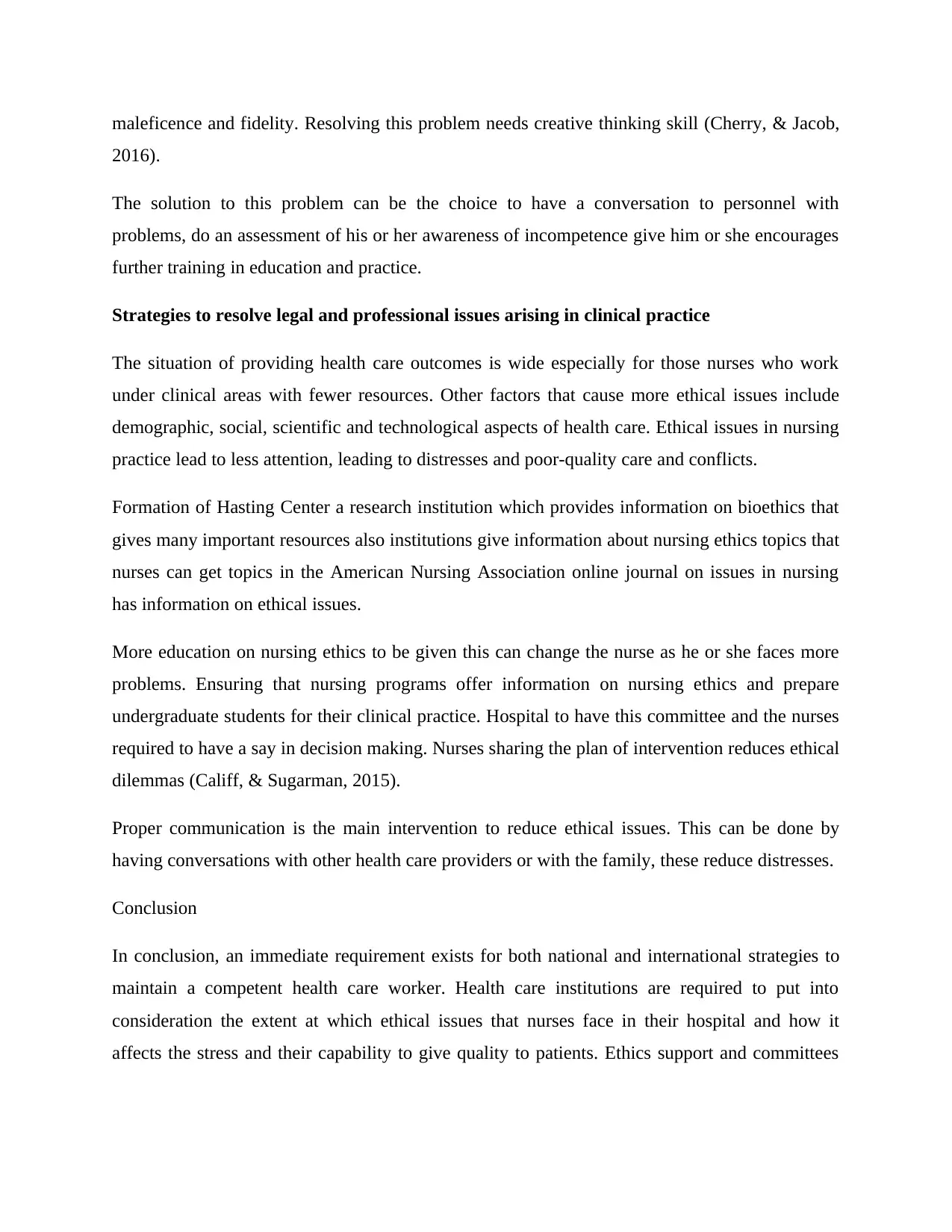
maleficence and fidelity. Resolving this problem needs creative thinking skill (Cherry, & Jacob,
2016).
The solution to this problem can be the choice to have a conversation to personnel with
problems, do an assessment of his or her awareness of incompetence give him or she encourages
further training in education and practice.
Strategies to resolve legal and professional issues arising in clinical practice
The situation of providing health care outcomes is wide especially for those nurses who work
under clinical areas with fewer resources. Other factors that cause more ethical issues include
demographic, social, scientific and technological aspects of health care. Ethical issues in nursing
practice lead to less attention, leading to distresses and poor-quality care and conflicts.
Formation of Hasting Center a research institution which provides information on bioethics that
gives many important resources also institutions give information about nursing ethics topics that
nurses can get topics in the American Nursing Association online journal on issues in nursing
has information on ethical issues.
More education on nursing ethics to be given this can change the nurse as he or she faces more
problems. Ensuring that nursing programs offer information on nursing ethics and prepare
undergraduate students for their clinical practice. Hospital to have this committee and the nurses
required to have a say in decision making. Nurses sharing the plan of intervention reduces ethical
dilemmas (Califf, & Sugarman, 2015).
Proper communication is the main intervention to reduce ethical issues. This can be done by
having conversations with other health care providers or with the family, these reduce distresses.
Conclusion
In conclusion, an immediate requirement exists for both national and international strategies to
maintain a competent health care worker. Health care institutions are required to put into
consideration the extent at which ethical issues that nurses face in their hospital and how it
affects the stress and their capability to give quality to patients. Ethics support and committees
2016).
The solution to this problem can be the choice to have a conversation to personnel with
problems, do an assessment of his or her awareness of incompetence give him or she encourages
further training in education and practice.
Strategies to resolve legal and professional issues arising in clinical practice
The situation of providing health care outcomes is wide especially for those nurses who work
under clinical areas with fewer resources. Other factors that cause more ethical issues include
demographic, social, scientific and technological aspects of health care. Ethical issues in nursing
practice lead to less attention, leading to distresses and poor-quality care and conflicts.
Formation of Hasting Center a research institution which provides information on bioethics that
gives many important resources also institutions give information about nursing ethics topics that
nurses can get topics in the American Nursing Association online journal on issues in nursing
has information on ethical issues.
More education on nursing ethics to be given this can change the nurse as he or she faces more
problems. Ensuring that nursing programs offer information on nursing ethics and prepare
undergraduate students for their clinical practice. Hospital to have this committee and the nurses
required to have a say in decision making. Nurses sharing the plan of intervention reduces ethical
dilemmas (Califf, & Sugarman, 2015).
Proper communication is the main intervention to reduce ethical issues. This can be done by
having conversations with other health care providers or with the family, these reduce distresses.
Conclusion
In conclusion, an immediate requirement exists for both national and international strategies to
maintain a competent health care worker. Health care institutions are required to put into
consideration the extent at which ethical issues that nurses face in their hospital and how it
affects the stress and their capability to give quality to patients. Ethics support and committees
⊘ This is a preview!⊘
Do you want full access?
Subscribe today to unlock all pages.

Trusted by 1+ million students worldwide
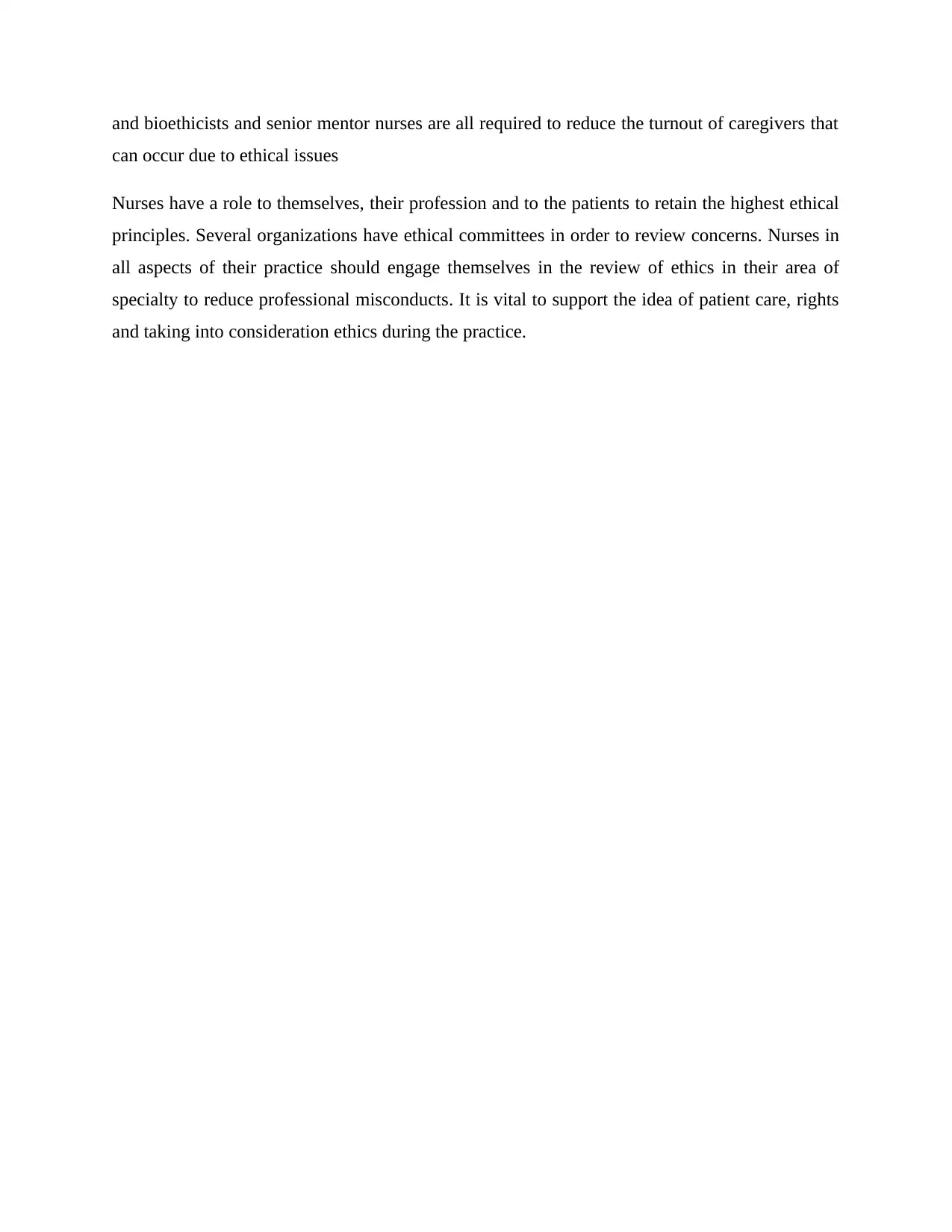
and bioethicists and senior mentor nurses are all required to reduce the turnout of caregivers that
can occur due to ethical issues
Nurses have a role to themselves, their profession and to the patients to retain the highest ethical
principles. Several organizations have ethical committees in order to review concerns. Nurses in
all aspects of their practice should engage themselves in the review of ethics in their area of
specialty to reduce professional misconducts. It is vital to support the idea of patient care, rights
and taking into consideration ethics during the practice.
can occur due to ethical issues
Nurses have a role to themselves, their profession and to the patients to retain the highest ethical
principles. Several organizations have ethical committees in order to review concerns. Nurses in
all aspects of their practice should engage themselves in the review of ethics in their area of
specialty to reduce professional misconducts. It is vital to support the idea of patient care, rights
and taking into consideration ethics during the practice.
Paraphrase This Document
Need a fresh take? Get an instant paraphrase of this document with our AI Paraphraser
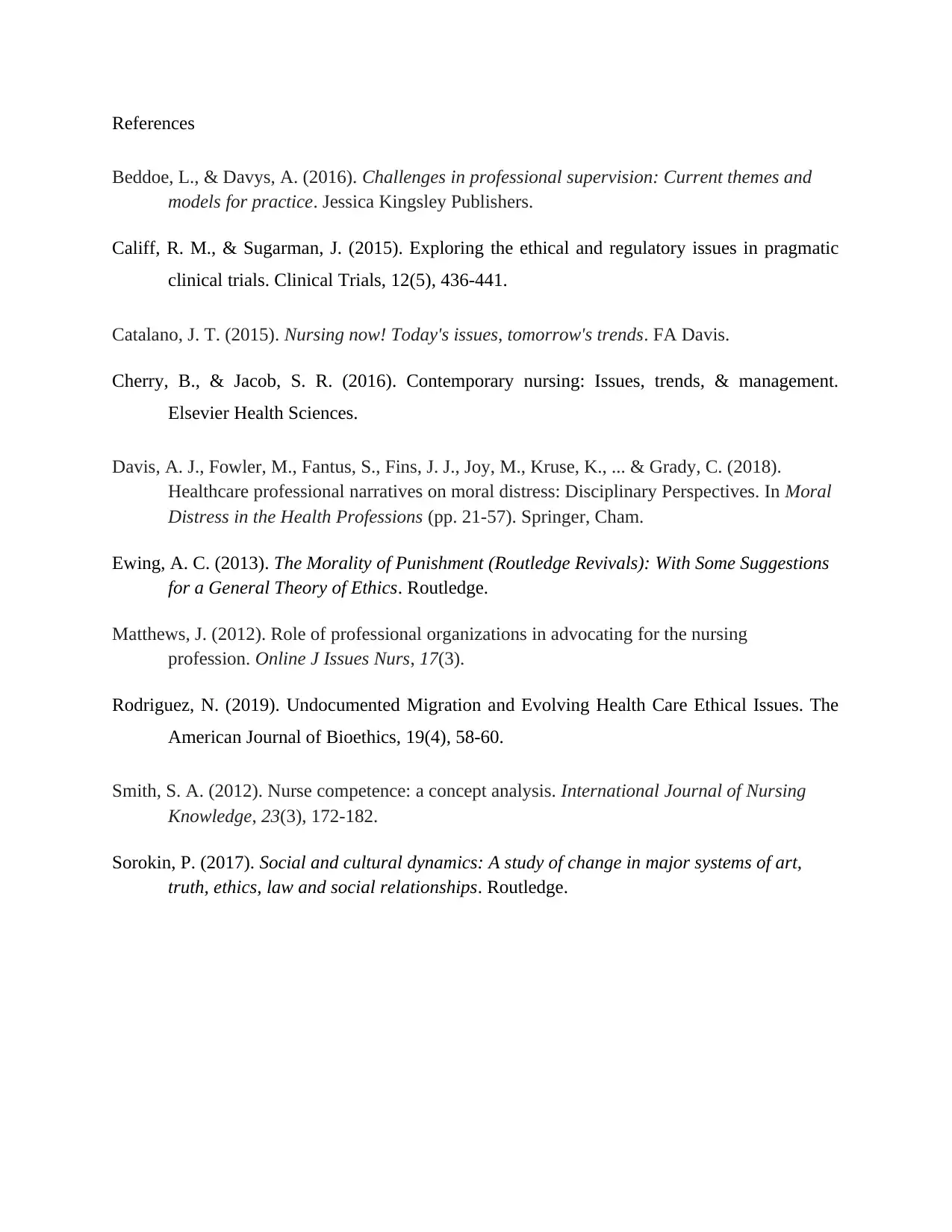
References
Beddoe, L., & Davys, A. (2016). Challenges in professional supervision: Current themes and
models for practice. Jessica Kingsley Publishers.
Califf, R. M., & Sugarman, J. (2015). Exploring the ethical and regulatory issues in pragmatic
clinical trials. Clinical Trials, 12(5), 436-441.
Catalano, J. T. (2015). Nursing now! Today's issues, tomorrow's trends. FA Davis.
Cherry, B., & Jacob, S. R. (2016). Contemporary nursing: Issues, trends, & management.
Elsevier Health Sciences.
Davis, A. J., Fowler, M., Fantus, S., Fins, J. J., Joy, M., Kruse, K., ... & Grady, C. (2018).
Healthcare professional narratives on moral distress: Disciplinary Perspectives. In Moral
Distress in the Health Professions (pp. 21-57). Springer, Cham.
Ewing, A. C. (2013). The Morality of Punishment (Routledge Revivals): With Some Suggestions
for a General Theory of Ethics. Routledge.
Matthews, J. (2012). Role of professional organizations in advocating for the nursing
profession. Online J Issues Nurs, 17(3).
Rodriguez, N. (2019). Undocumented Migration and Evolving Health Care Ethical Issues. The
American Journal of Bioethics, 19(4), 58-60.
Smith, S. A. (2012). Nurse competence: a concept analysis. International Journal of Nursing
Knowledge, 23(3), 172-182.
Sorokin, P. (2017). Social and cultural dynamics: A study of change in major systems of art,
truth, ethics, law and social relationships. Routledge.
Beddoe, L., & Davys, A. (2016). Challenges in professional supervision: Current themes and
models for practice. Jessica Kingsley Publishers.
Califf, R. M., & Sugarman, J. (2015). Exploring the ethical and regulatory issues in pragmatic
clinical trials. Clinical Trials, 12(5), 436-441.
Catalano, J. T. (2015). Nursing now! Today's issues, tomorrow's trends. FA Davis.
Cherry, B., & Jacob, S. R. (2016). Contemporary nursing: Issues, trends, & management.
Elsevier Health Sciences.
Davis, A. J., Fowler, M., Fantus, S., Fins, J. J., Joy, M., Kruse, K., ... & Grady, C. (2018).
Healthcare professional narratives on moral distress: Disciplinary Perspectives. In Moral
Distress in the Health Professions (pp. 21-57). Springer, Cham.
Ewing, A. C. (2013). The Morality of Punishment (Routledge Revivals): With Some Suggestions
for a General Theory of Ethics. Routledge.
Matthews, J. (2012). Role of professional organizations in advocating for the nursing
profession. Online J Issues Nurs, 17(3).
Rodriguez, N. (2019). Undocumented Migration and Evolving Health Care Ethical Issues. The
American Journal of Bioethics, 19(4), 58-60.
Smith, S. A. (2012). Nurse competence: a concept analysis. International Journal of Nursing
Knowledge, 23(3), 172-182.
Sorokin, P. (2017). Social and cultural dynamics: A study of change in major systems of art,
truth, ethics, law and social relationships. Routledge.
1 out of 8
Related Documents
Your All-in-One AI-Powered Toolkit for Academic Success.
+13062052269
info@desklib.com
Available 24*7 on WhatsApp / Email
![[object Object]](/_next/static/media/star-bottom.7253800d.svg)
Unlock your academic potential
Copyright © 2020–2026 A2Z Services. All Rights Reserved. Developed and managed by ZUCOL.





